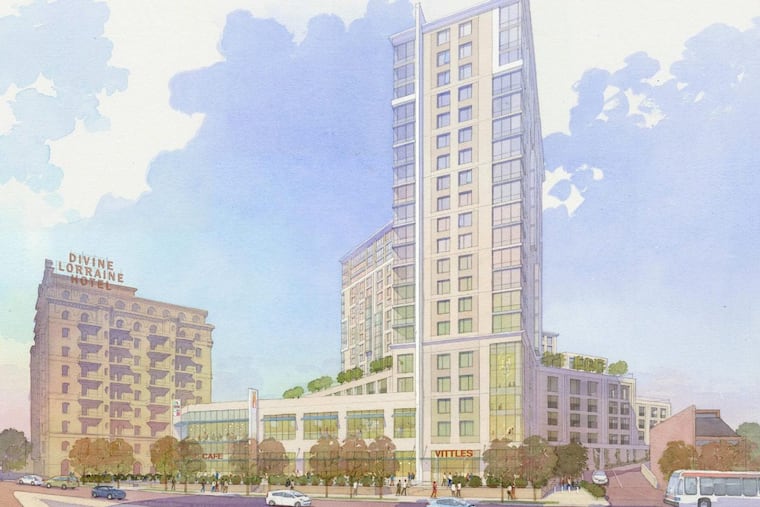Aldi sets sights on Center City shoppers with store below apartments planned near Divine Lorraine
With the move, Aldi is hoping to sustain a growth spurt by bringing its stripped down inventory of deeply discounted store-brand staples to city dwellers' doorsteps.

Discount grocer Aldi is set to fill almost half of the lower-story commercial space in the sprawling apartment complex planned near Broad and Fairmount Streets north of Center City, as the chain rejiggers its traditional strip-mall-friendly format to better fit the dense urban areas where it senses future growth.
The German-based grocer has signed a lease for 25,430 square feet at the 14-story project under development by RAL Cos. and Affiliates LLC at 1300 Fairmount St., now a vacant lot beside the recently renovated Divine Lorraine Hotel apartments, RAL told the Inquirer and Daily News ahead of an official announcement planned for this week.
With the move, Aldi's U.S. operation, based in Batavia, Ill., is hoping to sustain a growth spurt by bringing its stripped-down inventory of deeply discounted store-brand staples to city dwellers' doorsteps. It follows similar steps by higher-end grocers such as Whole Foods and Sprouts Farmers Market Inc. that have nestled themselves into other central Philadelphia apartment complexes.
"The areas that they haven't entered that much have been the denser urban areas," Craig Johnson, president of retail consultancy Customer Growth Partners LLC in Madison, Conn., said of Aldi. "This is a way they can kind of shoehorn in there."
Aldi also has opened or is in the process of opening what it calls "mixed-use development" stores in Chicago, Minneapolis, and the Washington, D.C., area, Bob Grammer, vice president for the Aldi division that covers eastern Pennsylvania, New Jersey and northern Delaware, said in an email.
The format accounts for "only a handful" of its more than 1,800 U.S. stores in 35 states, but "as we rapidly grow and expand to meet the needs of our evolving customer base, we're exploring more mixed-use development opportunities, mainly in urban areas," he said.
Aldi, which opened its first U.S. store in Iowa in 1976, has been able to undercut competing discounters such as Walmart Inc. by sourcing huge volumes of everyday foods such as eggs, milk and meat, and selling them under its in-house labels, which avoids marketing costs and other expenses associated with selling national brands.
If it is to fulfill its growth targets, it will likely have to make inroads into more affluent areas such as city centers. Aldi's expansion plans announced last year called for spending $3.4 billion to lift its store count to 2,500 locations by the end of 2022, putting it on track to become the nation's third-largest grocer after Walmart and Kroger Co.
Alongside that expansion, Aldi is in the midst of a $1.6 billion effort to renovate more than 1,300 of its existing stores by 2020 to better feature its produce, meat and bakery offerings, at least in part to lure more quality-conscious shoppers for whom price is not as important.
"They have worked in recent years to dial up the perception of freshness and quality," said Josh Broehl, senior vice president of Columbus, Ohio-based branding agency Big Red Rooster, part of real estate services firm JLL, which has worked with the grocer on its image. "That may have not been as clearly distinguished in the past."
Aldi recently remodeled its store on MacDade Boulevard in Collingdale, and more redone stores are due to open in the coming weeks in Exton, Norristown, and Marlton. Late last year it also opened a new Blue Bell store about two miles up Dekalb Pike from where it had operated an older location.
At the 1300 Fairmount apartment project, which will be Aldi's first in the Philadelphia area to deploy its mixed-use format, the grocer will share 58,760 square feet of commercial space with other tenants, including a 12,490-square-foot preschool to be operated by West Chester-based Nobel Learning Communities Inc.
"In a city where many people rely on walking or public transportation, a new supermarket in the area will be extremely valuable not only for the building's residents but also for the surrounding community," Spencer Levine, managing director of New York-based RAL, said in a release. The company aims to complete the project in 2020, it said.
Johnson, the retail consultant, said Aldi is wise to establish its first central Philadelphia project on Center City's northern fringe, where it's accessible to the chain's established clientele of value hunters as well as the presumably higher-income apartment dwellers who will live upstairs.
"They're trying to capture people not just in a lower-income situation, but in any income quintile," he said. "They are, in a sense, trying to have their cake and eat it, too."